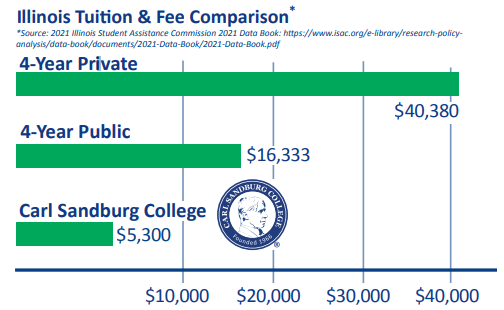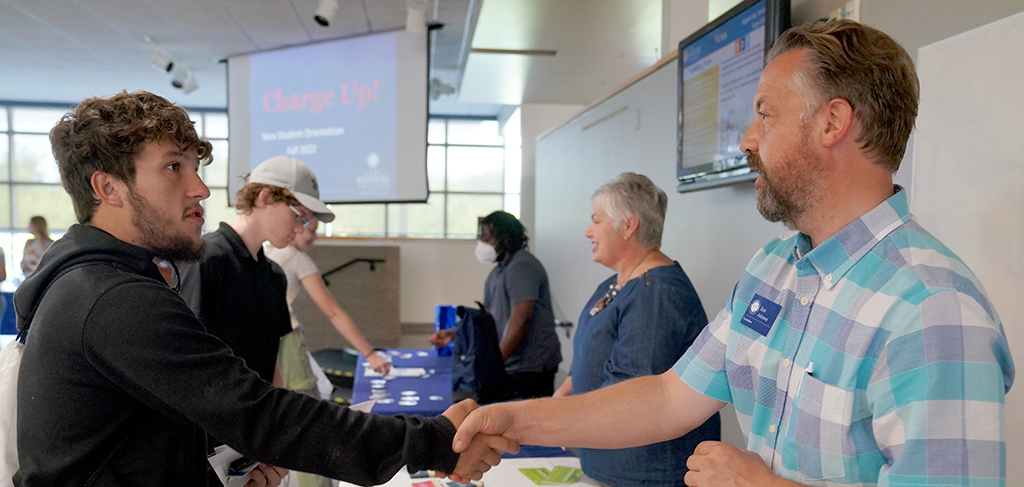Parent Information
At Sandburg, we understand that, as a parent, you likely have questions about community college, paying for college and college in general. We've answered some of the most frequently asked questions such as:
- How are community colleges different?
- What services/resources do colleges provide for their students?
- What is the FAFSA?
- And more...
If you have further questions, contact the Welcome Center!
What are community colleges?
Associate degree programs
Community colleges are public higher-education institutions that serve their local region. While colleges and universities mostly offer four-year bachelor degree programs, community colleges offer two-year associate degree programs where students can complete general education requirements before transferring to a four-year school to complete their bachelor’s degree. Because of this, community colleges are a strong option for students who have not picked a major or who want a more affordable option for the first two years of their bachelor’s degree.
Career & technical program offerings
Community colleges also offer a variety of career and technical programs where students can learn new skills or trades that result in them earning a certificate or associate in applied science (AAS) degree in that field. The types of these programs available at each community college varies, and they are often geared toward the occupational needs of the area the school serves.
Lower cost; no on-campus housing
While community colleges offer many of the same academic programs and student services of four-year schools, they are typically significantly less expensive, and most do not offer on-campus housing for students.
Stay close to home
The proximity for most people to a community college is another draw for those who may not want or be able to move away to attend college. Rather than spending money on room and board, students at
community colleges are able to commute or take public transportation. This also makes community colleges more attractive for students who wish to attend on a part-time basis.
How are community colleges different?
Open admission
While four-year schools have selective admission for students, community colleges typically have open admission — meaning they’re available to anyone who wants to enroll. Community colleges are an excellent option for students who may have struggled with their grades in high school, as they can build up their GPA during their time at a community college before applying to a four-year school.
Lower cost
Sandburg’s tuition and fees are nearly one-third of that for an Illinois four-year public university and one-sixth of the cost of an in-state private college or university.

Paying for college
Complete the FAFSA
Filing the Free Application for Federal Student Aid (FAFSA) is important for every student to ensure they’re not leaving any financial assistance on the table. We are able to
assist you in filing the FAFSA, even if you don’t plan on attending Sandburg.
Apply for other scholarships
Be sure to search and apply for outside scholarships. Ask your high school counselor, colleges you are applying to and your religious or civic groups about scholarships opportunities. Just remember you should never pay for scholarship information.
Contact the business office
Reach out to the business office at the college you plan to attend to see what payment options are available to you. Most schools will have payment plans if you're unable to pay your tuition bill in full. It’s also important to know dates such as tuition/fee deadlines and the school’s refund schedule if you need to drop a class.
What is FERPA?
FERPA
FERPA is the Family Educational Rights and Privacy Act, which is a federal law that protects the privacy of student education records. FERPA gives parents certain rights regarding their children’s education records, but those rights transfer to the student when they turn 18 or attend a school beyond the high school level. This means that colleges cannot directly share student information such as grades directly with a student’s parents.
College services
Accessibility services
Assists students with any type of disability, and strives to make the physical and learning environments of the college as accessible as possible.
Career services
Assists students with their preparation for entering the workforce. These offices can help with resume writing/editing, mock interviews and even a student’s job search.
Public safety/campus police
Tasked with keeping the college safe and responding to emergencies. Some schools may have sworn police officers who have arrest powers.
Tutoring services
Provides academic assistance to students in all subject areas. Tutoring and academic assistance are available to all students, not necessarily only those who may be struggling. In addition to in-person tutoring, many schools also offer online or distance tutoring options.
Bookstore
In addition to textbooks and college apparel, bookstores also carry other school supplies and technology equipment.
Carl Sandburg College resource room food pantry
Sandburg partners with River Bend Food Bank in Davenport, IA, to create an official food pantry on campus for Sandburg students. This free food pantry even includes fresh meat, fruit, vegetables and other items to help students fight food insecurity. The resource room is restocked monthly and is available to students just needing a quick snack to get through the day or stocking up on groceries for meals to cook at home. Free to all students at both the Galesburg and Carthage campuses.
Student life at Sandburg
Sandburg has several annual events (Welcome Week, October Bash and Spring Fest, just to name a
few) for students as well as other campus activities throughout the year to help you have fun and develop new relationships. We also have dozens of student clubs and organizations where you can get involved and be active on campus!
Frequently asked questions
What Is the FAFSA?
FAFSA stands for Free Application for Federal Student Aid. Filing this out is how students apply for federal and state financial aid for college. It’s important to file as soon as possible after December 1 of the year prior to attending so you can be eligible for certain funds before they become depleted. You can fill out the FAFSA online at
fafsa.gov.
What are general education (gen ed) requirements?
General education (often called gen ed) refers to the undergraduate courses students must complete in addition to those within their major to earn their degree. These are typically core courses in areas such as English, math, humanities and social sciences. Many of the classes in Sandburg’s associate in arts and associate in science programs can be transferred and count toward a student’s gen eds at a four-year school.
What are credit hours?
College courses are measured in credit hours. These units are typically measured in the approximate
amount of time a class meets each week. Most college classes are worth three credit hours. A typical course load for full-time students is 12-15 credit hours (or four to five classes) each semester.
What does IAI stand for? And what is it?
IAI stands for Illinois Articulation Initiative. It’s a statewide transfer agreement that includes more than 100 colleges and universities in the state, including Sandburg, and makes it easier for students to transfer their credits between schools in Illinois. It’s especially helpful for students who know they intend to transfer but are undecided on the college or university from where they plan to complete their bachelor’s degree.

